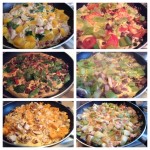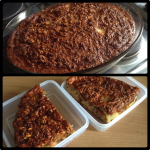Click here to catch-up on part 1 and the first six stages of my diet journey.
7. Travelling & gluten-free
When I went travelling in 2011 my paleo ideals began to fade. Guess what? In Latin Amercia, non-paleo foods like rice and beans are a staple and the people there do just fine. For the most part, they don’t get hung up on body image and weight loss. I tried to relax a little with my diet but felt bloated eating bread and drinking lots of beer. For the second part of my trip I followed a gluten-free diet without being super-strict. Happily, I still enjoyed trying all of the local foods.
When I returned home in 2012, binge eating was still an issue. With the occasional exception I pretty much followed a gluten-free diet for another 12 – 18 months. By this time, however, having freed myself from the paleo in-group bias, I was exposing myself to other ideas and beginning to question my beliefs. I began eating much more fruit as well as introducing rice, oats and some dairy without problems.
8. Moderation – the ‘eat everything kid’
In the last year, I’ve continued the process of becoming more flexible with my diet. One day I ordered prawn tacos at a local café assuming they’d come in a corn taco shell. When they arrived in a wheat wrap, I decided to eat them anyway. I felt fine and gradually began introducing more gluten-containing foods.
It’s been a slow process, with the occasional binge along the way, but I’ve been getting over the faulty ideas I’ve had around food and what it means to be healthy. I’m at the stage where I can – for the most part – pretty much eat everything again in moderation, without feeling bloated or compelled to binge. Without feeling that the day is ruined. It seems I’ve come full circle.
My diet is still based on a lot of the principles I’ve learned along the way – just without the dogma or emotional charge that we put on certain foods. The vast majority of my diet comes from whole, satiating, nutrient dense foods and I prioritise protein. At the moment, I find that tracking calories and macronutrients throughout the week helps me to eat an appropriate amount of food – something I found difficult after years of eating at irregular times, eating in the absence of hunger, and binge eating. There are some foods I still don’t eat a lot of, either because I’m just not a huge fan of them, or I just don’t feel that great eating them. But nothing is off-limits. At weekends, I just try to eat sensibly and usually enjoy some dessert.
And you know what? Life is better that way. I’m leaner and happier and better able to enjoy social situations than I was when I followed a heavily restricted diet. I don’t look like a fitness model. And I do still overeat occasionally. But I’m strong and healthy and able to enjoy my food and my life. And dessert is pretty good!
The Lessons
1. You’re not broken
The chances are, you’re not broken. It’s unlikely that you’re a sugar addict. It’s unlikely you’re intolerant to gluten. It’s unlikely that you’re merely overweight because of your genes or your slow metabolism. What’s more likely is that you’ve bought into some faulty ideas about food and health and you’re being too rigid or are just not eating the right amount of food and nutrients to support your goal or needs.
I’m not saying that health issues and food intolerances don’t exist. Just that it’s more likely you’re not doing the fundamentals. I don’t know if my gut and gluten issues were real or psychosomatic. I did learn to pay attention to how food makes me feel and what food choices help me feel at my best. It’s possible that by going gluten-free I gave my gut a chance to heal. But it’s so easy to fall into the trap of ‘feeling’ negative symptoms just because you believe a certain food is problematic. Curiously, my improvement also coincided with the time I began to question my beliefs and look at what the evidence says about gluten-sensitivity.
2. Calories count
It took me a long time to accept this. Yes, food quality is very important. But calories do count. Any diet that has you losing weight without counting calories does so by tricking you into eating fewer calories.
By the same token, when you try to do a ton of physical activity without eating sufficient calories, you should expect to experience some negative symptoms or health issues (refer again to point 1).
3. Being health freak isn’t actually healthy
Being healthy is about coping well with the rigours of life. If you have a long list of foods you cannot eat, you’re not healthy. You’re fragile. (The obvious exception being if you have a specific, diagnosed medical condition). If you cannot hang out with friends or enjoy social events because you’re anxious and worried about breaking your diet, you’re not healthy. Following a heavily restricted diet only to periodically lose control and furiously binge isn’t healthy. If that’s you, I don’t need to tell you how bad it feels.
4 Everything works …until it doesn’t
New diets tend to make us feel better because they give us something our previous diet didn’t. Eventually, the new restriction becomes unsustainable too. A healthy diet is one that is sustainable and flexible enough to allow to you live and enjoy your life – without disordered behaviour. When you restrict foods, you give them a certain power. The scarcity principle makes them more valuable and increases the likelihood of you bingeing on those very foods.
5. Question your guru
There are a lot of faulty ideas in the fitness and nutrition industry. In hindsight, in the holistic health crowd, and the paleo community, I can see I was following the wrong people. Question your guru. Question your information. It might sound logical but what evidence is there to support it? Click here for more on who to listen to.
6. Question your beliefs
Educate yourself about logical fallacies. Then question your beliefs. Is that diet really the answer? Do you really just need to do it better? Or could it be that there’s another approach?
The funny thing is, I was never overweight in the first place! Sure I encountered some problems along the way but most of my problems were a result of my judgements. Judgements of foods. Judgements of my body and how I should look. Judgements of what it takes to be healthy. These were the real cause of my issues.
The hardest part of this is that when we believe something, it always seems genius at the time. It’s hard to genuinely question our beliefs. We’re biased. And when we are introduced to information that contradicts our beliefs, we tend to dismiss it right away. The idea that I could eat some less nutritious, processed foods in moderation and still be lean and healthy – and stop binging – was outrageous to me. Sometimes you’ve got to reach a certain point before you’re ready and open to change.
I hope this helps. I’d love to hear your comments below. If you’d like to hear more from me, check out my book, Energy Is Everything: Mindset, Nutrition & Exercise for the best version of you. It’s available on Amazon in paperback and Kindle.
Always Keep Reaching!
Mike
References
Gaesser GA, Angadi SS. Gluten-free diet: imprudent dietary advice for the general population? J Acad Nutr Diet. 2012 Sep;112(9):1330-3
Witthöft M1, Rubin GJ. Are media warnings about the adverse health effects of modern life self-fulfilling? An experimental study on idiopathic environmental intolerance attributed to electromagnetic fields (IEI-EMF). J Psychosom Res. 2013 Mar;74(3):206-12. doi: 10.1016/j.jpsychores.2012.12.002. Epub 2012 Dec 23.
Ziauddeen H, Fletcher PC. Is food addiction a valid and useful concept? Obes Rev. 2013 Jan;14(1):19-28. doi: 10.1111/j.1467-789X.2012.01046.x. Epub 2012 Oct 12.








All things in moderation? Great pair of articles, thanks.
I really needed to read this. I started paleo about 2 years ago in an attempt to clear up my skin and improve my physique. Initially it worked and I was feeling great, but then I started stressing about each meal and avoiding some of my favourite foods, I think this stress led to gut issues.
A year into my paleo diet I’m feeling like crap, trying to experiment with probiotics, high carb, low carb, FODMAPS, GAPS diets, etc etc. and nothings worked, I’ve been miserable for almost a year now.
Tomorrow morning after gym I’m going to eat some oats and whatever else I want, because f*** it, I won’t die.
Thanks Isaac, you’re certainly not alone on this. Ironically, the f*** it attitude might just be the healthiest for some of us!
Yup, I’ve totally been there. Except my binges caused me unsightly weight gain (first time being overweight in my life–my doctor told me to lose 20 pounds). This is coming from being athletic and at a good weight and having never had any food phobias, even as a female with pressure to be thin from the world around me. It was Paleo that started my negative relationship and obsession with food and body image, to the point where it was seriously concerning. (Btw, a great book that I used to break free was “Brain Over Binge”) And the ironic thing is, I too began Paleo because I thought it would give me athletic gains, even though I already was strong and in good shape.
Yup, I too learned from this debacle. I was on it for at least a year, year and a half before I slowly started eating oats and–surprise!–I didn’t blow up and all was well.
Life’s too short for dogmatic, pseudo-based science, ya know? Sure, there are genuine food issues and allergies, but to simply eliminate entire food groups based on some quackery, that generations around the world have been thriving on, and create a strong belief system around it? Simply irresponsible to perpetrate. Also not surprising since it has made quite a few bloggers/”caveman” sales people rich, but that’s a different story.
I’m glad I got out, and good for you for doing the same! I think the only thing that Paleo was good for was encouraging me to increase the bulk of vegetables in my diet and think about the source of my meat–but hey, that advice has been out there all along…
By the way, I’m now in the best shape of my life while relaxed about food, enjoying the hell out of oats, bread, pasta and the occasional beer. Cheers! And say no to diets.
Hi Polly,
Thanks for sharing, it’s a shame that what starts as self-improvement can end up like this. So glad to hear you managed to get out and turn things around! 🙂
Thank you for writing this – this sums up how I am feeling right now went from replacement shakes to a stint of clean eating that turned into Paleo and I think it has caused more intolorances than ever before and am having mini-anxiety attacks about food and not being able to complete my workouts like I was a only 6 mths ago or run due to lack of energy and stress is just making me sick?! On top of that I seem to keep injuring myself, I suppose because I am exhausted during my workouts they aren’t as strong as they once were. I feel like I took a wrong turn somewhere because I swear when I started Paleo I felt fantastic but suddenly not so much, more bad days than good the past two months 🙁 think I need to take a reality check with my life and focus on being happy instead. Advice would be great!
Hi Amanda,
Thanks for commenting. If you have food intolerances and anxiety, I would suggest reaching out to a qualified professional in your area – not a trainer, but someone who is trained specifically to help you with these challenges. Aside from that, my suggestion in general would be to try to relax. Go back to basics. Forget all the rules around food and exercise and listen to your body. Do some exercise you enjoy, and rest as much as you feel you need to. Focus on sleep and relaxation
Sorry I cannot offer more specific advice online. I hope this is somewhat helpful.
Mike
Very helpful and that is exactly what I intend on doing 🙂
I have a definite lactose intolerance but I know how to deal with that – but all the other things I sort of ‘picked’ up doing Whole30/Paleo because of their ‘toxins’ as you suggest and now I am sort of second guessing them, plus I have IBS which is predominantly driven by any lapse of anxiety therefore being anxious about food makes me sick regardless of what I eat but your post really was helpful and I spoke to my partner and we are going to start trialing different foods for me over a longer time period and evaluate them, trialling what works and doesn’t work for me regardless of what the media says 🙂 Thanks again for being so real!
Good luck Amanda, let me know how it goes 🙂
I used to frequent paleohacks and other paleo websites, and then one day it hit me – I wasn’t getting enough calories. And, I had developed a fear of foods (gluten, vegetable oils, sugars), which is synonymous with an eating disorder. Thanks to websites like youreatopia.com and 180degreehealth, I am finding my way back. Thank you for publishing this.
Thanks MP, I appreciate the comment. Good luck on your journey 🙂